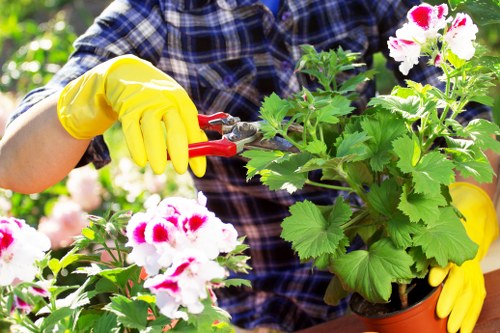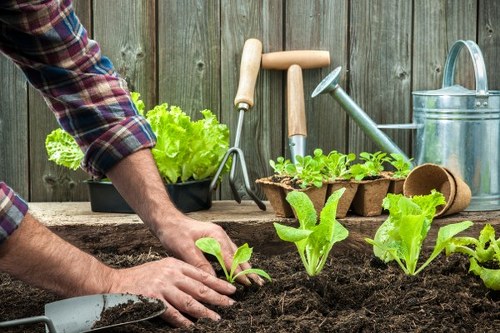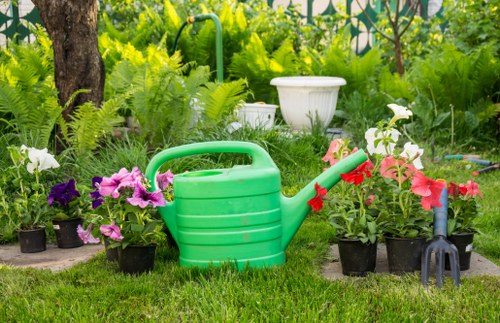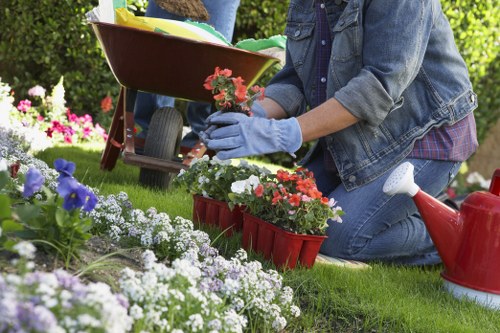Comprehensive Guide to Garden Maintenance in Chessington

Maintaining a beautiful garden in Chessington requires a blend of passion, knowledge, and consistent effort. Whether you're a seasoned gardener or a beginner, understanding the intricacies of garden care can transform your outdoor space into a vibrant and thriving oasis.
Chessington's climate, soil types, and local flora play significant roles in determining the best maintenance practices. By tailoring your garden maintenance routine to these factors, you can ensure a lush and healthy garden throughout the year.
In this article, we'll delve into essential garden maintenance tips, seasonal tasks, and expert advice to help you achieve the garden of your dreams in Chessington.
Understanding the Chessington Climate

Chessington experiences a temperate maritime climate, characterized by mild winters and cool summers. This climate influences the types of plants that thrive in the region and the maintenance practices required to keep them healthy.
Key climatic factors to consider include:
- Temperature Variations: Mild winters with occasional frosts and cool summers.
- Rainfall: Moderate to high rainfall throughout the year, promoting healthy plant growth but also necessitating proper drainage.
- Sunlight Exposure: Varies across different parts of the garden, affecting plant placement and care.
Understanding these factors helps in selecting suitable plants and planning effective maintenance schedules.
Selecting the Right Plants for Your Garden

Choosing plants that are well-suited to Chessington's climate and soil conditions is crucial for minimizing maintenance efforts and ensuring a thriving garden.
Consider the following when selecting plants:
- Hardiness: Opt for plants that can withstand local temperature ranges and weather conditions.
- Soil Compatibility: Assess your garden's soil type (clay, sandy, loamy) and choose plants that flourish in those conditions.
- Sunlight Requirements: Match plants to areas of your garden based on their sunlight needs, whether full sun, partial shade, or full shade.
- Watering Needs: Select drought-tolerant or moisture-loving plants based on your watering capabilities and soil drainage.
Popular plant choices for Chessington gardens include roses, lavender, ferns, and native wildflowers, each bringing unique colors and textures to your outdoor space.
Seasonal Garden Maintenance Tasks

Effective garden maintenance involves addressing different tasks throughout the seasons. Here's a month-by-month guide tailored for Chessington:
Spring
Spring is a time of renewal and growth. Key tasks include:
- Pruning shrubs and trees to encourage healthy growth.
- Planting new flowers and vegetables as the soil warms.
- Fertilizing lawns to promote lush greenery.
Summer
During the summer months, focus on:
- Regular watering, especially during dry spells.
- Weeding to prevent unwanted plants from taking over.
- Deadheading flowers to encourage continuous blooming.
Autumn
As temperatures drop, prepare your garden by:
- Cleaning up fallen leaves to prevent fungal diseases.
- Planting bulbs for spring blooms.
- Protecting sensitive plants from early frosts.
Winter
Winter maintenance includes:
- Pruning dormant plants to shape and remove dead branches.
- Cleaning and storing garden tools.
- Planning next year's garden layout and plant selections.
Essential Garden Tools and Equipment

Having the right tools can make garden maintenance more efficient and enjoyable. Essential tools for Chessington garden care include:
- Pruning Shears: For trimming and shaping plants.
- Lawn Mower: To maintain a neat and healthy lawn.
- Garden Fork: For aerating soil and removing weeds.
- Watering System: Drip irrigation or hoses with adjustable nozzles.
- Gardening Gloves: To protect your hands while working.
Investing in high-quality tools not only enhances efficiency but also ensures longevity and better results in your garden maintenance efforts.
Pest and Disease Management
Protecting your garden from pests and diseases is crucial for maintaining plant health. Implementing integrated pest management (IPM) strategies can help:
- Regular Monitoring: Inspect plants regularly for signs of pests or diseases.
- Natural Predators: Encourage beneficial insects like ladybugs and bees.
- Proper Sanitation: Remove dead plant material to reduce disease sources.
- Chemical Controls: Use pesticides judiciously and opt for eco-friendly options when possible.
By staying proactive, you can minimize the impact of pests and diseases, ensuring a vibrant and resilient garden.
Hardscaping and Garden Structures
Incorporating hardscaping elements such as paths, patios, and garden structures can enhance both the functionality and aesthetics of your garden in Chessington.
Consider the following:
- Paths and Walkways: Define areas of the garden and provide easy access to different sections.
- Patios: Create outdoor living spaces for relaxation and entertainment.
- Garden Structures: Add pergolas, benches, or sheds to improve usability and organization.
Choosing materials that complement your garden's style and ensuring proper installation will result in lasting and attractive garden features.
Sustainable Gardening Practices
Embracing sustainable gardening practices not only benefits the environment but also promotes a healthier garden. Key sustainable practices include:
- Composting: Recycle organic waste into nutrient-rich compost for your plants.
- Rainwater Harvesting: Collect rainwater to reduce water usage and support plant hydration.
- Native Plants: Incorporate native species that require less water and are more resistant to local pests.
- Mulching: Use organic mulches to retain soil moisture and suppress weeds.
Implementing these practices contributes to a sustainable and low-maintenance garden, ensuring long-term beauty and health.
Hiring Professional Garden Maintenance Services
While DIY garden maintenance is rewarding, there are times when professional assistance can be invaluable.
Benefits of hiring professionals in Chessington include:
- Expertise: Access to specialized knowledge and skills for complex garden tasks.
- Time-Saving: Free up your schedule by delegating time-consuming maintenance activities.
- Quality Results: Ensure high standards of garden care and aesthetic appeal.
When selecting a garden maintenance service, consider factors such as experience, range of services offered, and customer reviews to make an informed decision.
Conclusion
Maintaining a garden in Chessington is a fulfilling endeavor that enhances your property and provides a serene retreat. By understanding the local climate, selecting appropriate plants, performing seasonal maintenance, and adopting sustainable practices, you can cultivate a vibrant and resilient garden.
Whether you choose to manage your garden independently or seek professional assistance, the key to success lies in consistent care and a passion for nurturing nature.
Ready to transform your garden? Contact us today and let our expert team help you achieve the garden of your dreams in Chessington.